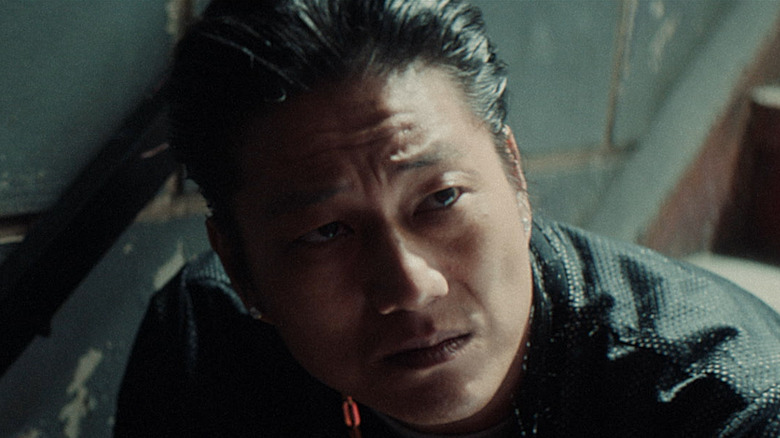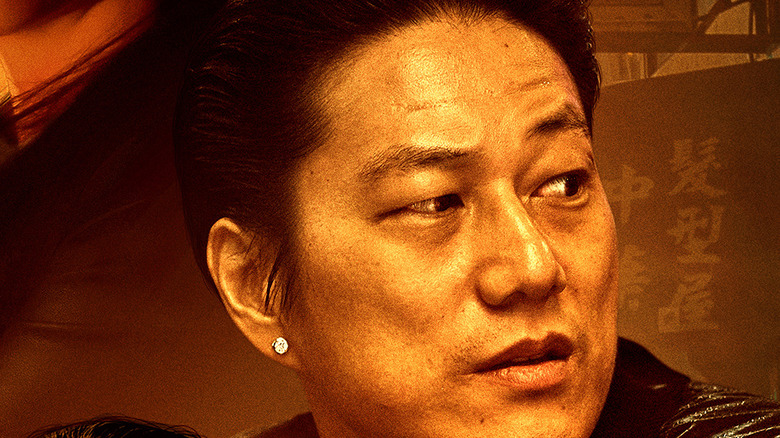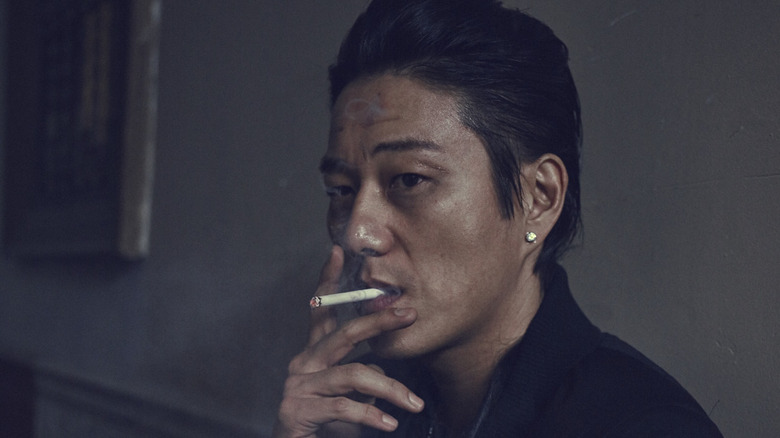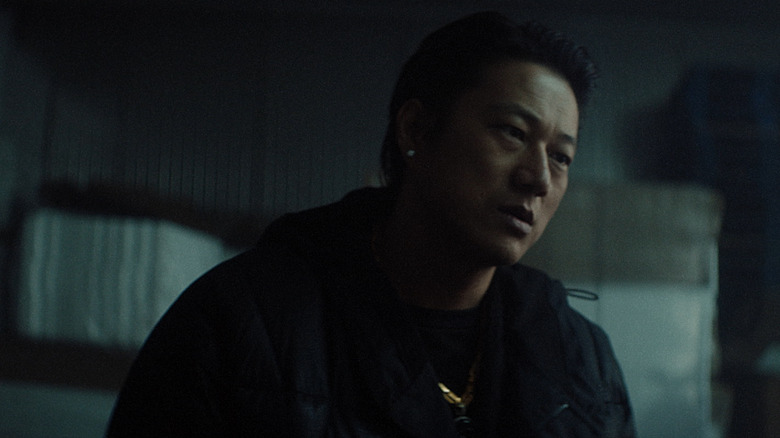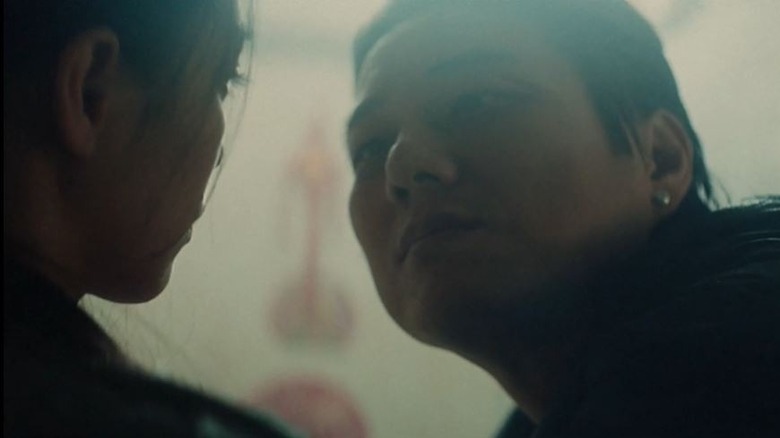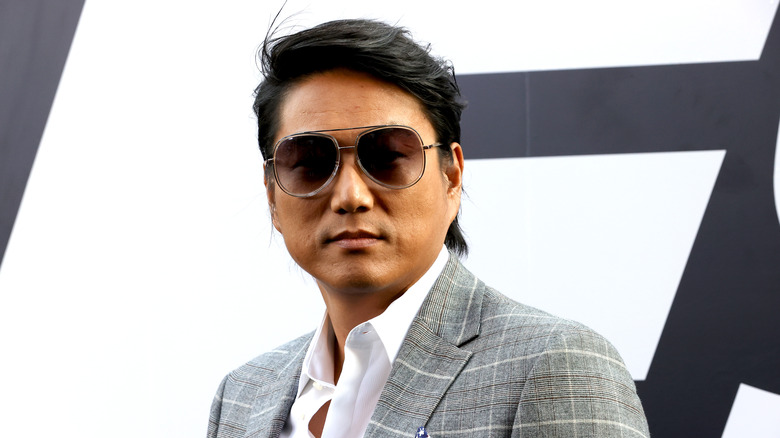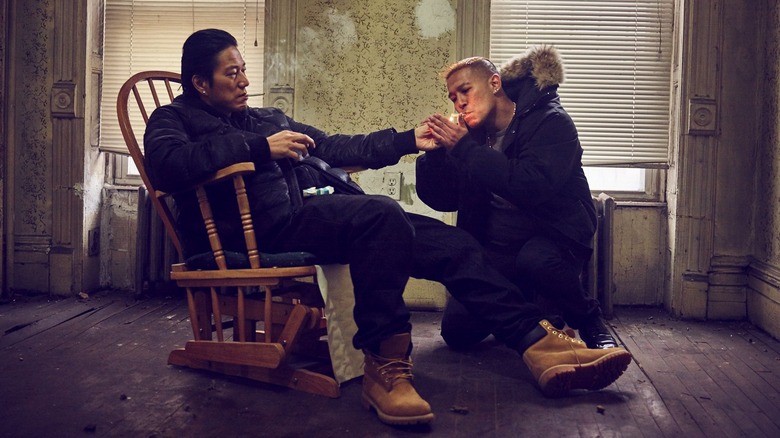Sung Kang Talks Snakehead, Star Wars, And The Importance Of Asian Stories - Exclusive Interview
"Snakehead" follows Sister Tse (Shuya Chang), a Chinese woman living in New York's Chinatown and looking for her long-lost daughter. She was brought to America by the titular Snakeheads, Chinese gangsters who specialize in smuggling humans out of China. Indebted to the Snakeheads, Sister Tse works to get the attention of the leadership and rise through the ranks to pay off what she's owed quicker.
Sung Kang (best known as Han from the "Fast & Furious" franchise) plays Rambo, the violent and unstable son of crime family matriarch Dai Mah. Though his mother is more dangerous, he is far less predictable and far less respected — a deadly combination. Kang spoke with Looper about "Snakehead," telling us about playing a hardened criminal, the challenges of independent filmmaking, and why Rambo feels so comfortable in his aquarium. He also spoke about the importance of Asian representation onscreen — as heroes, villains, and everything in between.
Multi-dimensional characters
You've obviously had a long and varied career. You've played lots of different people. But in the popular imagination between "Better Luck Tomorrow," this, and the Fast series, you're kind of associated with criminal characters, tough characters. And even when you play a good guy, like a prosecutor, you're kind of the villain. Do you ever just want to play a really nice baker who doesn't get into trouble or something?
Sure. Absolutely. I'm an actor. I would love to play all different types of characters. When you put it that way, it's kind of sad that maybe I've played these similar one-dimensional type of characters at times, or most of the time. But yeah, of course, man. And that's what I hope and aspire to, to be able to play just a baker, that it's human and relatable on that level.
I wouldn't say they're one-dimensional. Everybody loves Han, but we're not here to talk about Han — we're here to talk about "Snakehead." So this is an Asian-led story. It's almost entirely an Asian cast, and it's coming out at a time when Asian stories are really coming to the forefront. We have "Shang-Chi" that just came out, "Crazy Rich Asians," "Minari," all these things. How does it feel to be part of that bigger scheme?
It's great. I mean, it's nice to see just simply that there's opportunity that's happening. If there's one film with an Asian American actor or cast every decade, it's hard. You start starving for content. And as an actor, there's no hope. And just simply, if you see other people that look like you, and there's stories with Asians in it, it just gives you hope that's possible and there's going to be opportunities to tell more stories.
A rainbow of different perspectives
And this is actually a pretty dark story, too. This is a story where nobody's 100% good and even the noble people will willingly do nasty things to survive. What do you think it's important to tell those kinds of stories?
I think we're going to tell all different types of stories. There has to be a rainbow of different perspectives and different people within a certain ethnicity for us to start breaking down preconceived prejudices and notions and stereotypes. The question earlier, it was like, do you think it's bad to maybe depict Asian Americans within the criminal dark side, right?
And it's continuous in Hollywood cinema, but within these stories, if you can ... These characters can be relatable on a three-dimensional level. I mean, it doesn't matter if you're a gangster or a CPA. If you have problems and difficulty with your mother, because you live in the shadow of your older brother and you're never going to live up to your mom's expectations, that human experience is relatable in any geography, in any family dynamic. It doesn't matter where you come from. Right?
Did you do any research into the snakehead world yourself when you were doing this?
Yeah, well, you know how they say the location is a character many times in the film? And the benefit was that we were in New York shooting, and I got to meet a lot of people that knew the real Dai Mah, people like Sister Tse that live in Chinatown, that were part of the underbelly, or it's still part their world, because it's not all gone.
And so, to be able to meet these individuals and then walk in with a certain prejudice, if you want. And you go, "Oh, you guys all must be just like bad people." But then you realize, nah, they're mothers, they're actually community leaders. In a way, what they do balances the community. They actually help more than hurt. So, an interesting window and great education.
Independent filmmaking
I want to talk about a very specific shot from the movie that fascinated me, which is when everybody was in the restaurant, and they were all eating. And it looked like there was a camera on a lazy Susan in the middle of the table. What was that?
That's called "independent filmmaking because we have no money to do it the other way, with a Steadicam, or with tracks." [Laughs] I mean, so that's a lazy Susan. It's basically a contraption on the table anyway, and then you put the camera on it, and you spin it. And then you just hope that you get something. And then, so the actors, they have to dance with the camera as it spins. So it's just called ingenuity, independent filmmaking. It's what it is.
Speaking of independent filmmaking, you kind of got your start there with "Better Luck Tomorrow." You've been in some of the biggest blockbusters in the world. How does it feel doing these smaller movies compared with, say, "F9"?
It's so different. You just have more time and more resources. And that's about it. But once the camera rolls, the craft is exactly the same. The good thing about the indie films is that you see what you're made of, because there's a lot of things to complain about, because you can't pay for it, or you can't solve it with money.
But at the same time, just because you have a bunch of money doesn't mean that you're going to make a great film. So I think it's nice to see both, it's nice to have hot coffee compared to day-old coffee. And that's about it, man. But it's all fine. It's only for a few months, and then it's over.
Why Rambo likes fish
There's a lot of rough and tumble scenes in here, especially with your character. Were there any that were uncomfortable to shoot? I'm not saying you felt unsafe or anything, but you just felt uncomfortable with the character's actions in a certain way.
Sure. I mean, Rambo is uncomfortable in his skin. He's the person that is overcompensating in everything he does, even the way he combs his hair, the people he has around, his actions, the way he walks. So yeah. I think, in Rambo's skin, I was constantly uncomfortable. It's nothing that I would wear. I would not carry myself that way. I wouldn't wear all that jewelry. There's something going on inside. You got some overcompensation happening. Right?
Yeah. And he also has a thing for fish. In the movie, he obviously does. And later he says, "The arowana special," which made me laugh, because "Arowana" is the production company. What was the point of the obsession with the fish?
Well, first, Evan, the director, is a big arowana fan. That's his production company. And he always has fish at his house. He's always raising fish and taking care of them. So I think fish and films over history, it allows the pacing to stop and then give a different window into the lens of the character.
Rambo is so dynamic and loud and big. When he's with his fish, it's probably the only time that he's truly himself and he's able to connect. And it's funny that he can only connect with something that can't talk back. But then there's this, methodical kind of poetry with the fish.
And it's simple. There's laws of nature. If you feed and you take care, it survives. Or if you don't, then it dies. And also, the fish need Rambo. So I think it symbolizes this place of solace. This is where he comes to unwind, and this is his temple and his hiding place. It's where he hibernates, and he's able to be the true child behind this big character Rambo.
Star Wars
So it's not squarely related to "Snakehead," but if I don't ask about this, they're going to get angry back at home, which is: you just let loose the other day that you have a lightsaber in the upcoming "Obi-Wan" show. What's it like using the Force?
I would love to talk about that, but if I do, I'm going to get in a lot of trouble. The fans have to wait. I shouldn't have said anything. I can't talk about this, because they've actually ... The powers that be, they're very protective of what they want to share with the fans. So I think I'm going to keep my mouth shut. I would love to share, because look, man, I'm a huge fan. And I want to share the whole world with everybody else, because I feel like it's selfish not to share. But it's worth the wait. That's all I can say. This is worth the wait, guys, worth the wait.
Rambo's sympathetic qualities
Rambo is kind of the villain of the movie in some ways, but what do you think is his most sympathetic aspect?
I think most of us who've had a mother can identify with the need to be validated and have mama's approval, and it's so sad. And it's like, I think that's why there is a multi-dimension to Rambo, is that underneath all that bravado, there's a kid that just wants to be loved by his mom. Simple. That's what he's driven by. All the things he does is to get mama's approval, which he'll never yet.
And his mother is more ruthless than he is.
Mm-hmm. True. True.
So what do you want people to take away from "Snakehead"?
It's a good question. What will one do for their purpose? And then what are the consequences? It's like everything in life has a consequence, and there's a story behind everyone. It's easy to see a world of human smugglers, if you will. It's easy to put that label on and go, "Yeah, they're in some ghetto part of Chinatown, and this is the element that they come from." But behind it, there's usually a reason. And there's something probably that you as a human can identify with. And for someone to make it all the way over to America, and risk their life and do all of that, dude, they must be pretty tragic. And there must be some heavy, heavy, heavy, consequences at home, for you to stay, for you to do that.
So I think that's what I want people to take away, is that hopefully there's answers, or it makes you rethink preconceived notions of what this world is. And then when you hear about it, it's not just this kind of throwaway thing of these evildoers. There's a few reasons why they're doing this, why this exists.
The crime thriller "Snakehead" will be released in theaters, on Digital, and On-Demand on October 29th.
